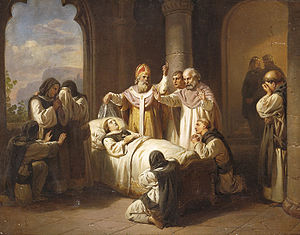Saint Margaret of Hungary
| Saint Margaret of Hungary, O.P. | |
|---|---|

"The Death of Saint Margaret" by József Molnár (1857)
|
|
| Nun and Virgin | |
| Born | January 27, 1242 Klis Fortress, Klis, Kingdom of Croatia |
| Died | January 18, 1271 (aged 28) Nyulak Szigete Kingdom of Hungary |
| Venerated in |
Roman Catholic Church (Dominican Order) |
| Beatified | July 28, 1789 by Pope Pius VI |
| Canonized | November 19, 1943 by Pope Pius XII |
| Feast | January 18 |
| Attributes | A lily and a book |
Saint Margaret, O.P., (January 27, 1242 – January 18, 1271) was a Dominican nun and the daughter of King Béla IV of Hungary and Maria Laskarina. She was the younger sister of St. Kinga of Poland (Kunegunda) and the Blessed Yolanda of Poland and, through her father, the niece of the famed Saint Elizabeth of Hungary.
Margaret was born in Klis Fortress in the Kingdom of Croatia, the eighth and last daughter (9th of 10 children) of the royal couple. They resided there during the Mongol invasion of Hungary (1241–42) as her father was also ruler of this land. Her parents vowed that if Hungary was liberated from the Mongols, they would dedicate the child to religion.
The four-year-old Margaret was entrusted by her parents to the Dominican monastery at Veszprém in 1245. Six years later she was transferred to the Monastery of the Blessed Virgin founded by her parents on Nyulak Szigete (Rabbit Island) near Buda (today Margaret Island, named after her, and a part of Budapest; the ruins of the monastery can still be seen). She spent the rest of her life there, dedicating herself to religion and opposing all attempts of her father to arrange a political marriage for her with King Ottokar II of Bohemia. She appears to have taken solemn vows when she was eighteen years old. In marked contrast to the customs of her Order, she received the Consecration of Virgins along with some other royals to prevent further attempts on the part of her father to have her vows dispensed by the pope for marriage.
Many of the details of her life are known from the Legend of Saint Margaret, written probably in the 14th century and translated from Latin to Hungarian in the 15th. The only remaining copy of the legend is in the Margaret Codex copied by the Dominican nun Lea Ráskay around 1510. According to the legend, Margaret chastised herself from early childhood, wore an iron girdle, hairshirts and shoes spiked with nails. She later also performed the dirtiest tasks in the monastery.
...
Wikipedia
